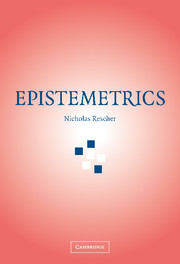Book contents
- Frontmatter
- Contents
- Preface
- 1 Asking for More Than Truth: Duhem's Law of Cognitive Complementarity
- 2 Kant's Conception of Knowledge as Systematized Information
- 3 Spencer's Law of Cognitive Development
- 4 Gibbon's Law of Logarithmic Returns
- 5 Adams's Thesis on Exponential Growth
- 6 Quality Retardation
- 7 How Much Can Be Known? A Leibnizian Perspective on the Quantitative Discrepancy Between Linguistic Truth and Objective Fact
- 8 On the Limits of Knowledge: A Kantian Perspective on Cognitive Finitude
- Conclusion
- Bibliography
- Index of Names
3 - Spencer's Law of Cognitive Development
Published online by Cambridge University Press: 06 August 2009
- Frontmatter
- Contents
- Preface
- 1 Asking for More Than Truth: Duhem's Law of Cognitive Complementarity
- 2 Kant's Conception of Knowledge as Systematized Information
- 3 Spencer's Law of Cognitive Development
- 4 Gibbon's Law of Logarithmic Returns
- 5 Adams's Thesis on Exponential Growth
- 6 Quality Retardation
- 7 How Much Can Be Known? A Leibnizian Perspective on the Quantitative Discrepancy Between Linguistic Truth and Objective Fact
- 8 On the Limits of Knowledge: A Kantian Perspective on Cognitive Finitude
- Conclusion
- Bibliography
- Index of Names
Summary
(1) Herbert Spencer's “Law of Cognitive Development” through taxonomic exfoliation depicts an important phenomenon in the growth of cognition. (2) This is amply illustrated by the history of science, which tells an ongoing story of taxonomic complexification. (3) Such increasing complexity is the price exacted by scientific progress. (4) On the basis of Spencer's Law it can be seen that the actual knowledge inherent in the mass of information stands not as the volume thereof, but merely as its logarithm.
Spencer's Law: the Dynamics of Cognitive Complexity
Already well before Darwin, the English philosopher Herbert Spencer (1820–1903) argued that organic evolution is characterized by Karl Ernst von Baer's (1792–1876) law of development “from the homogeneous to the heterogeneous” and thereby produces an ever-increasing elaborateness of detail and complexity of articulation. As Spencer saw it, organic species in the course of their development confront a successive series of environmental obstacles, and with each successful turning along the maze of developmental challenges the organism becomes selectively more highly specialized in its bio-design, and thereby more tightly attuned to the particular features of its ecological context.
Now this view of the developmental process may be of limited applicability in biological evolution, but there can be little question about its holding good in cognitive evolution. For rational beings will of course try simple things first and thereafter be led step by step toward an ever-enhanced complexification.
- Type
- Chapter
- Information
- Epistemetrics , pp. 15 - 28Publisher: Cambridge University PressPrint publication year: 2006



